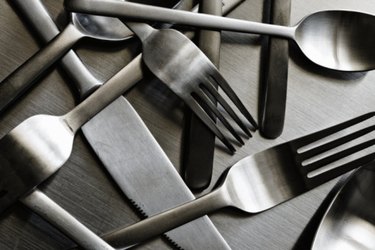Things You'll Need
Basin, container or bucket
Ammonia
Dishcloth
White vinegar
Baking soda
Stainless steel polish

Silverware is a catchall term for eating utensils. Generally, stainless steel flatware is the dishwasher-safe type of silverware. Laws and regulations forced detergent manufacturers to discontinue the use of phosphates in their products. Although phosphate-free products are better for the environment than phosphate inclusive products, the result is less than stellar. Many times, after a complete cycle through the dishwasher, silverware looks spottier, dirtier and worse in general than before washing it. The residue is the result of hard water deposits on the silverware.
Step 1
Load a plastic dish basin with the affected silverware. Fill the basin almost to the top with hot water from the tap. Add 1 tsp. of household ammonia. Allow the silverware to soak for 30 to 40 minutes. Pour the water out of the basin. Rinse the silverware well with plain, cool water and dry with a dishcloth.
Video of the Day
Step 2
Wash the flatware in the dishwasher a second time. Remove the flatware from the dishwasher before the drying cycle begins. Dry the silverware by hand with a soft dish towel.
Step 3
Place the silverware in a large plastic container, bucket or dish basin. Pour an equal mixture of white vinegar and water over the silverware until the mixture covers the silverware entirely. Allow the silverware to soak for 15 to 20 minutes. Remove the silverware, rinse well and dry by hand with a soft dish towel.
Step 4
Mix 1 tbsp. baking soda with water to form a thick paste. Dip the corner of a clean, wet rag into the paste and rub onto the flatware. Rinse well with plain water and dry with a dishcloth.
Step 5
Apply a commercially available stainless steel polish to the residue-laden silverware with a soft rag. Buff the polish off with a clean, soft rag.
Tip
Add a rinse agent to dishwashers to help prevent spotting. Add 1/2 cup of borax to the bottom of the dishwasher before running the dishwasher to soften hard water. Check your hot water heater temperature to ensure it is set to at least 120 degrees Fahrenheit.
Warning
Do not allow flatware to soak in white vinegar for an extended length of time; the acidic nature of the vinegar can cause pitting.
Video of the Day